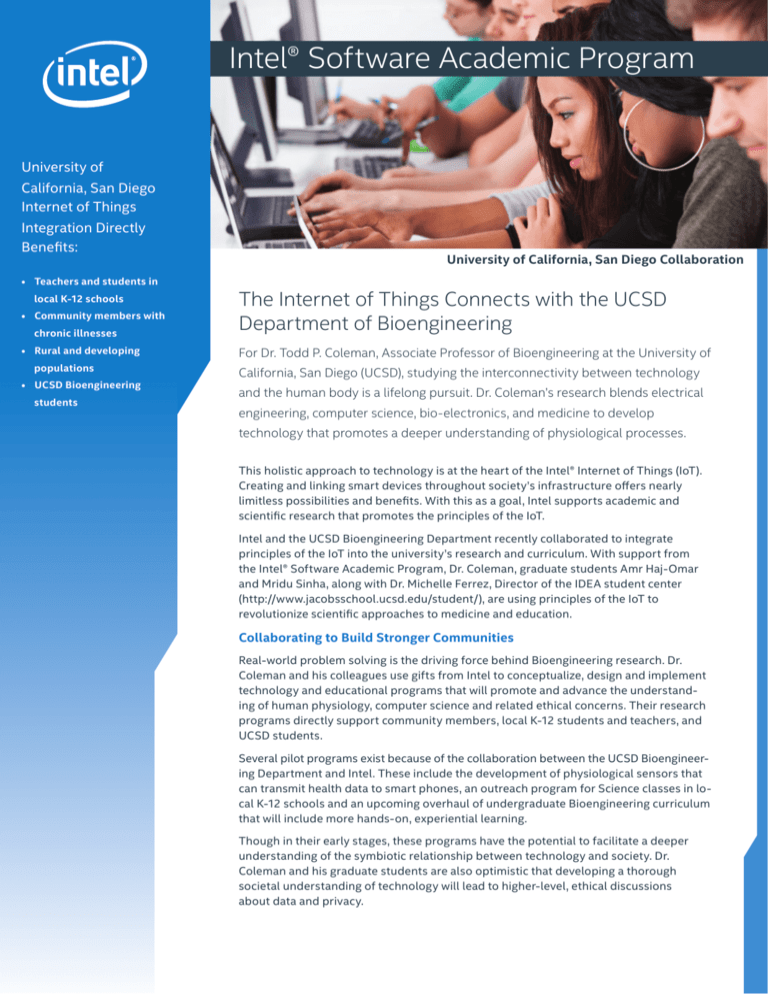
Intel® Software Academic Program
University of
California, San Diego
Internet of Things
Integration Directly
Benefits:
• Teachers and students in
local K-12 schools
• Community members with
chronic illnesses
• Rural and developing
populations
• UCSD Bioengineering
students
University of California, San Diego Collaboration
The Internet of Things Connects with the UCSD
Department of Bioengineering
For Dr. Todd P. Coleman, Associate Professor of Bioengineering at the University of
California, San Diego (UCSD), studying the interconnectivity between technology
and the human body is a lifelong pursuit. Dr. Coleman’s research blends electrical
engineering, computer science, bio-electronics, and medicine to develop technology that promotes a deeper understanding of physiological processes.
This holistic approach to technology is at the heart of the Intel® Internet of Things (IoT).
Creating and linking smart devices throughout society’s infrastructure offers nearly limitless possibilities and benefits. With this as a goal, Intel supports academic and scientific research that promotes the principles of the IoT.
Intel and the UCSD Bioengineering Department recently collaborated to integrate principles of the IoT into the university’s research and curriculum. With support from the Intel® Software Academic Program, Dr. Coleman, graduate students Amr Haj-Omar
and Mridu Sinha, along with Dr. Michelle Ferrez, Director of the IDEA student center
(http://www.jacobsschool.ucsd.edu/student/), are using principles of the IoT to revolutionize scientific approaches to medicine and education.
Collaborating to Build Stronger Communities
Real-world problem solving is the driving force behind Bioengineering research. Dr.
Coleman and his colleagues use gifts from Intel to conceptualize, design and implement
technology and educational programs that will promote and advance the understanding of human physiology, computer science and related ethical concerns. Their research
programs directly support community members, local K-12 students and teachers, and
UCSD students.
Several pilot programs exist because of the collaboration between the UCSD Bioengineering Department and Intel. These include the development of physiological sensors that
can transmit health data to smart phones, an outreach program for Science classes in local K-12 schools and an upcoming overhaul of undergraduate Bioengineering curriculum
that will include more hands-on, experiential learning.
Though in their early stages, these programs have the potential to facilitate a deeper
understanding of the symbiotic relationship between technology and society. Dr. Coleman and his graduate students are also optimistic that developing a thorough societal understanding of technology will lead to higher-level, ethical discussions about data and privacy.
Harvard University Collaboration
Intel® Software
Intel® Software Academic
Program
Academic
Program
University of California, San Diego Collaboration
Developing Technology for a Healthier World
Scientists at the UCSD Bioengineering lab believe that when people have a better understanding of their bodies, they are more likely to take proactive steps to
improve their health. This principle drives the research Dr. Coleman and his colleagues conduct with patients suffering from chronic health issues, such as obesity
and diabetes. One current program utilizes wearable sensors and applications that
can transmit data about physical activity, including information about digestion,
heart rate, and how long the body was active or at rest. This technology helps provide a clear picture of a patient’s daily exertion, which is invaluable to doctors and
patients. Ultimately, these sensors and applications can help doctors develop individualized best practices for food and exercise that are specific to their patients.
Technology is going to be all
around us in the future and it
Across the world, UCSD scientists are also using the principles of the IoT to bring
healthcare to developing areas. Acknowledging the dearth of healthcare facilities
in rural Africa and the seemingly ubiquitous presence of smart phones, graduate
student Amr Haj-Omar is developing programs that will utilize biomonitoring sensors and transmission applications to remotely connect patients and doctors via
smart phones. Potential programs include using the sensors to monitor the spread
and treatment of malaria in rural African populations, and to provide prenatal and
obstetrical care to women in remote villages. If implemented successfully, the program would enable midwives, local volunteers and even non-medical community
members to get real-time advice from a doctor thousands of miles away.
possible to amplify and Collaborating with the Intel® Software Academic Program enables the UCSD Bioengineering Department to continue the development and implementation of these
revolutionary programs. Underscoring its commitment to academic and health
research, Intel has provided critical hardware and software support that enable
rapid prototyping.
accelerate technology, but Propelling Science Classrooms into the 21st Century
also to ask ourselves, “What Thanks to the broad portfolio of support provided by the Intel® Software Academic
Program, UCSD Bioengineering is improving Science instruction in California’s K-12
schools, and within its own department.
will change the way we live our lives. The IoT makes it is the best use for this data?
What makes sense?” – Dr. Todd P. Coleman, UCSD
Recently, California joined seven other states to create and adopt the Next Generation Science Standards (NGSS). Beginning in the fall semester of 2014, schools will
be required to teach to these standards, which include instruction in engineering
and computer science. To help schools and teachers make this transition, UCSD
Bioengineering graduate students Mridu Sinha and Amr Haj-Omar are working with
Michelle Ferrez, Director of the IDEA student center, to pilot an outreach program
in K-12 schools in North San Diego County. The program showcases a collection of
technology designed to promote high-level technical understanding and utilizes
the principles of IoT to create interactive course modules and teaching templates.
UCSD Bioengineering also intends to continue implementing the principles of the
IoT within its own department. Plans are underway to create new courses that
utilize interconnected technology to provide more experiential learning opportunities, and to promote interdepartmental collaboration.
For more information on the Intel® Software Academic Program,
please visit: https://software.intel.com/en-us/academic
Copyright © 2014 Intel Corporation. All rights reserved. Intel and the Intel logo are trademarks of Intel Corporation in the U.S. and/or other countries.
*Other names and brands may be claimed as the property of others.Printed in USA
Please Recycle





